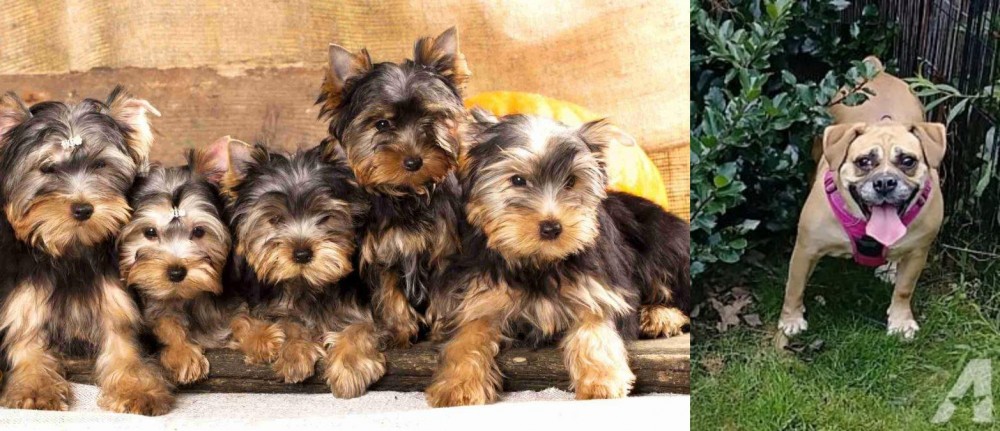 Yorkshire Terrier is originated from United Kingdom but Beabull is originated from United States. Yorkshire Terrier may grow 17 cm / 6 inches shorter than Beabull. Yorkshire Terrier may weigh 10 kg / 22 pounds lesser than Beabull. Yorkshire Terrier may live 4 years more than Beabull. Both Yorkshire Terrier and Beabull has almost same litter size. Yorkshire Terrier requires High Maintenance. But Beabull requires Moderate Maintenance
Yorkshire Terrier is originated from United Kingdom but Beabull is originated from United States. Yorkshire Terrier may grow 17 cm / 6 inches shorter than Beabull. Yorkshire Terrier may weigh 10 kg / 22 pounds lesser than Beabull. Yorkshire Terrier may live 4 years more than Beabull. Both Yorkshire Terrier and Beabull has almost same litter size. Yorkshire Terrier requires High Maintenance. But Beabull requires Moderate Maintenance
Basic Information
Group:
Toy dog
Companion dog
Origin:
United Kingdom
United States
Life Span:
12 - 15 Years
8 - 11 Years
Colors Available:
Blue & Tan, Black & Tan, Blue & Gold, Black & Gold
white, brown brindle
Coat:
Silky
have short, coarse hair that tends to shed a lot
Temperament:
Alert, Courageous, Energetic, Independent, Intelligent, Loyal, Playful
Independent, Loving, Loyal, Playful
Grooming:
High Maintenance
Moderate Maintenance
Trainability:
Moderate
Moderate
New Owners Friendly:
Yes
Yes
History
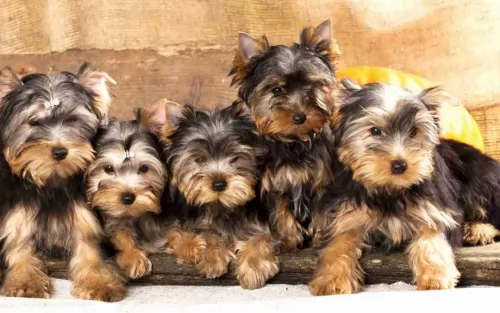 The Yorkshire terrier originated in Yorkshire which is a place in northern England. In mid 19th century workers from Scotland came to Yorkshire in search for work. They brought different varieties of small terriers with them. Earlier they are known as Broken Haired Scotch Terrier and then Toy Terrier. In 1874 they were officially named as Yorkshire Terrier. They begun their journey as hunting dogs and later developed as companion dogs. AKC registered the breed in 1878.
The Yorkshire terrier originated in Yorkshire which is a place in northern England. In mid 19th century workers from Scotland came to Yorkshire in search for work. They brought different varieties of small terriers with them. Earlier they are known as Broken Haired Scotch Terrier and then Toy Terrier. In 1874 they were officially named as Yorkshire Terrier. They begun their journey as hunting dogs and later developed as companion dogs. AKC registered the breed in 1878.
The Beabull is known as a designer breed rather than a purebred. The Beabull is a cross between a Beagle and an English Bulldog. This breed is a loving dog, playful and physically strong. They are independent and can be stubborn. Their origins are not well documented, but it is thought they were developed about 20 years ago. Although not recognized by the American Kennel Club because they are not purebred dogs
Description
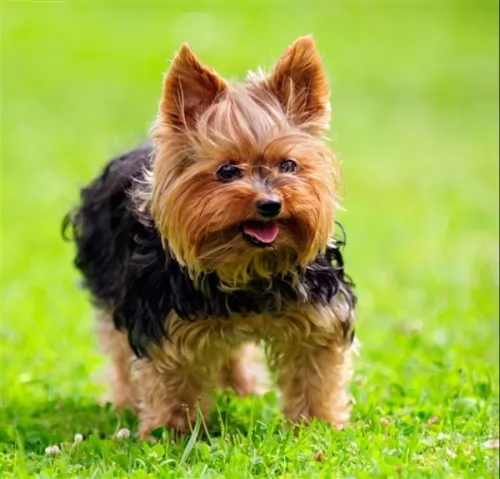 Yorkshire terriers are one of the glamorous member of the dog breeds. They have excellent personality as their owner will be surely proud of them when taking them in public. They like to go outside and make adventures. They are good companion dogs and watch dogs too. They are very affectionate with their owners. Yorkies always bark when any stranger comes and they should be taught about neighbours and when to bark. They will get angry on seeing new dogs and surely chases squirrels.
Yorkshire terriers are one of the glamorous member of the dog breeds. They have excellent personality as their owner will be surely proud of them when taking them in public. They like to go outside and make adventures. They are good companion dogs and watch dogs too. They are very affectionate with their owners. Yorkies always bark when any stranger comes and they should be taught about neighbours and when to bark. They will get angry on seeing new dogs and surely chases squirrels.
They like to spend more time with their people. Leaving them alone for long time is not good. Yorkshire terrier should be treated gently and with love. They love to spend time with older children. They love apartment life if they are made to play and walk daily. Yorkies are the second most popular dog in America.
The first generations of the Beabulls are a 50-50 mix, but most of the breed today are multigenerational dogs. This means a Beabull is mixed with another Beabull to try to create a purebred over time. Most of the Beabulls are a mixture and are very unpredictable in their looks and characteristics, depending upon which of the original parent breeds they favor most.
Many will retain the wrinkles, short legs, underbite and short tail of the Bulldog. Others will have the long droopy ears and long muzzles of the Beagle. Most will have coarse, short coats and shed quite a bit. They are medium to large depending upon which size Beagle is used in the crossing.
Characteristics
Children friendliness
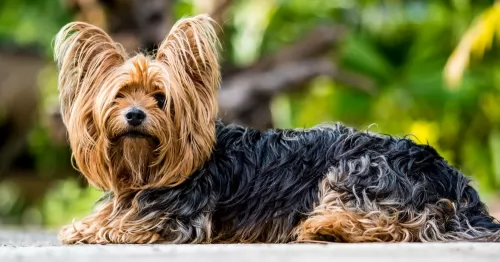 Yorkshire terrier are not so much friendly with children. It is not advised to leave them with children without adult supervision.
Yorkshire terrier are not so much friendly with children. It is not advised to leave them with children without adult supervision.
Special talents
They were previously used to catch rats and hunt badger and fox. They are excellent watchdogs and defend their territory very well.
Adaptability
They adapts well for apartment living. But they will not be happy if leaved alone for a long time. Yorkies cannot tolerate too hot or cold weather.
Learning ability
They are moderately easy to train. Yorkshire terrier should be trained early when they are amenable to process. Sessions should be conducted with lots of treats and must be short as they will easily get bored.
1.Children friendliness – Very good with children.
2.Special talents intelligent and many with a great sense of smell.
3.Adaptability – They can live anywhere in an apartment or a home with a yard.
4.Learning ability – Very intelligent but with a stubborn, independent streak that is inherent in both parental breeds.
Health Problems
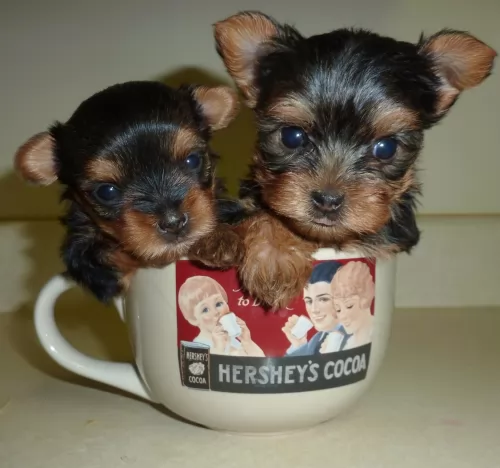 Yorkshire terrier have possibilities of having hip dysplasia, elbow dysplasia, hypothyroidism and von willebrand's disease.
Yorkshire terrier have possibilities of having hip dysplasia, elbow dysplasia, hypothyroidism and von willebrand's disease.
Hair fall
Usually yorkies don't shed more. They have long, silky and straight hair. They should be made to bath weekly once.
Although most Beabulls will not have inherited health problems there are some issues they are all prone to:
• Bloat – can be fatal if not addressed immediately – inverted digestive organs.
• Hip Dysplasia – can cause lameness.
• Canine Disk Disease – can cause paralysis, loss of legs.
• Hypothyroidism
• Ear infections – keep them clean.
• Patellar Luxation – floating kneecaps – can cause lameness.
• Reverse Sneezing
Caring The Pet
Feeding the puppy
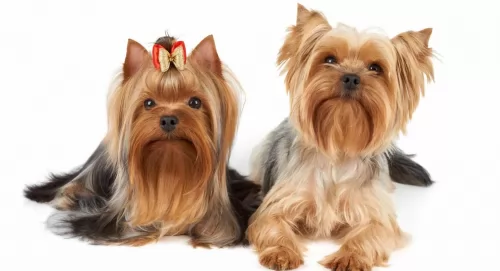 For English bull dog puppies, When you change the puppy food from liquid to solid initially you must give what the dam is having. This is to avoid digestive problems when new food is introduced. The level of liquid food should be reduced in a step by step manner and thus increasing solid food gradually.
For English bull dog puppies, When you change the puppy food from liquid to solid initially you must give what the dam is having. This is to avoid digestive problems when new food is introduced. The level of liquid food should be reduced in a step by step manner and thus increasing solid food gradually.
Feeding the adult
You have two choices and one is manufactured dog food and another is home cooked food. Commercial brands are not suggested as they contain artificial coloring and chemical preservatives.
Points for Good Health
Vaccinations should be made at the right time. The food given should be the best.
Games and Exercises
Yorkshire terrier should be taught tricks by giving rewards. Exercising them has benefits such as maintaining muscles, release pent-up energy, good for heart, good metabolism, good sleep and be active.
1.Feeding the puppy – Don’t overfeed due to tendency for obesity and don’t feed right before or after exercise due to threat of bloat. Feed 3-4 meals per day a total of 1.5 cups in a day.
2.Feeding the adult - Don’t overfeed due to tendency for obesity and don’t feed right before or after exercise due to threat of bloat. Feed 3-4 meals per day a total of 3 cups in a day.
3.Points for Good Health no hereditary issues
4. Games and Exercises – both the laziness of the Bulldog and the scent driven energy or the Beagle can be seen in the Beabull. They have short bursts of the Beagles hyperness. Enjoy playing fetch and participating in agility. They need a daily 45-60 minute walk.
Comparison with other breeds
- Yorkshire Terrier vs English Bulldog - Breed Comparison
- Yorkshire Terrier vs German Shepherd - Breed Comparison
- Yorkshire Terrier vs Golden Retriever - Breed Comparison
- Yorkshire Terrier vs Labrador Retriever - Breed Comparison
- Yorkshire Terrier vs West Highland White Terrier - Breed Comparison
- Yorkshire Terrier vs French Bulldog - Breed Comparison
- Yorkshire Terrier vs Beagle - Breed Comparison
- Poodle vs Yorkshire Terrier - Breed Comparison
- Rottweiler vs Yorkshire Terrier - Breed Comparison
- Boxer vs Yorkshire Terrier - Breed Comparison
- English Pointer vs Yorkshire Terrier - Breed Comparison
- Siberian Husky vs Yorkshire Terrier - Breed Comparison
- Doberman Pinscher vs Yorkshire Terrier - Breed Comparison
- American Bully vs Yorkshire Terrier - Breed Comparison
- Abruzzenhund vs Yorkshire Terrier - Breed Comparison
- Affenpinscher vs Yorkshire Terrier - Breed Comparison
- Afghan Hound vs Yorkshire Terrier - Breed Comparison
- Aidi vs Yorkshire Terrier - Breed Comparison
- Airedale Terrier vs Yorkshire Terrier - Breed Comparison
- Akbash Dog vs Yorkshire Terrier - Breed Comparison
- Akita vs Yorkshire Terrier - Breed Comparison
- Africanis vs Yorkshire Terrier - Breed Comparison
- Askal vs Yorkshire Terrier - Breed Comparison
- Atlas Terrier vs Yorkshire Terrier - Breed Comparison
- Aussie Poo vs Yorkshire Terrier - Breed Comparison
- Beabull vs English Bulldog - Breed Comparison
- Beabull vs German Shepherd - Breed Comparison
- Beabull vs Golden Retriever - Breed Comparison
- Beabull vs Labrador Retriever - Breed Comparison
- Beabull vs West Highland White Terrier - Breed Comparison
- Beabull vs French Bulldog - Breed Comparison
- Beabull vs Beagle - Breed Comparison
- Beabull vs Yorkshire Terrier - Breed Comparison
- Beabull vs Poodle - Breed Comparison
- Beabull vs Rottweiler - Breed Comparison
- Beabull vs Boxer - Breed Comparison
- Beabull vs English Pointer - Breed Comparison
- Beabull vs Siberian Husky - Breed Comparison
- Beabull vs Doberman Pinscher - Breed Comparison
- Beabull vs American Bully - Breed Comparison
- Beabull vs Abruzzenhund - Breed Comparison
- Beabull vs Affenpinscher - Breed Comparison
- Beabull vs Afghan Hound - Breed Comparison
- Beabull vs Aidi - Breed Comparison
- Beabull vs Airedale Terrier - Breed Comparison
- Beabull vs Akbash Dog - Breed Comparison
- Beabull vs Akita - Breed Comparison
- Beabull vs Africanis - Breed Comparison
- Beabull vs Askal - Breed Comparison
- Beabull vs Atlas Terrier - Breed Comparison
 Petzlover
Petzlover Yorkshire Terrier is originated from United Kingdom but Beabull is originated from United States. Yorkshire Terrier may grow 17 cm / 6 inches shorter than Beabull. Yorkshire Terrier may weigh 10 kg / 22 pounds lesser than Beabull. Yorkshire Terrier may live 4 years more than Beabull. Both Yorkshire Terrier and Beabull has almost same litter size. Yorkshire Terrier requires High Maintenance. But Beabull requires Moderate Maintenance
Yorkshire Terrier is originated from United Kingdom but Beabull is originated from United States. Yorkshire Terrier may grow 17 cm / 6 inches shorter than Beabull. Yorkshire Terrier may weigh 10 kg / 22 pounds lesser than Beabull. Yorkshire Terrier may live 4 years more than Beabull. Both Yorkshire Terrier and Beabull has almost same litter size. Yorkshire Terrier requires High Maintenance. But Beabull requires Moderate Maintenance The Yorkshire terrier originated in Yorkshire which is a place in northern England. In mid 19th century workers from Scotland came to Yorkshire in search for work. They brought different varieties of small terriers with them. Earlier they are known as Broken Haired Scotch Terrier and then Toy Terrier. In 1874 they were officially named as Yorkshire Terrier. They begun their journey as hunting dogs and later developed as companion dogs. AKC registered the breed in 1878.
The Yorkshire terrier originated in Yorkshire which is a place in northern England. In mid 19th century workers from Scotland came to Yorkshire in search for work. They brought different varieties of small terriers with them. Earlier they are known as Broken Haired Scotch Terrier and then Toy Terrier. In 1874 they were officially named as Yorkshire Terrier. They begun their journey as hunting dogs and later developed as companion dogs. AKC registered the breed in 1878. Yorkshire terriers are one of the glamorous member of the dog breeds. They have excellent personality as their owner will be surely proud of them when taking them in public. They like to go outside and make adventures. They are good companion dogs and watch dogs too. They are very affectionate with their owners. Yorkies always bark when any stranger comes and they should be taught about neighbours and when to bark. They will get angry on seeing new dogs and surely chases squirrels.
Yorkshire terriers are one of the glamorous member of the dog breeds. They have excellent personality as their owner will be surely proud of them when taking them in public. They like to go outside and make adventures. They are good companion dogs and watch dogs too. They are very affectionate with their owners. Yorkies always bark when any stranger comes and they should be taught about neighbours and when to bark. They will get angry on seeing new dogs and surely chases squirrels. Yorkshire terrier are not so much friendly with children. It is not advised to leave them with children without adult supervision.
Yorkshire terrier are not so much friendly with children. It is not advised to leave them with children without adult supervision. For English bull dog puppies, When you change the puppy food from liquid to solid initially you must give what the dam is having. This is to avoid digestive problems when new food is introduced. The level of liquid food should be reduced in a step by step manner and thus increasing solid food gradually.
For English bull dog puppies, When you change the puppy food from liquid to solid initially you must give what the dam is having. This is to avoid digestive problems when new food is introduced. The level of liquid food should be reduced in a step by step manner and thus increasing solid food gradually.